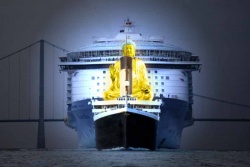Toying around with the waves of the medium
For a long time I have been toying around with the ideas of transverse waves, longitudinal compression waves, including torsion waves, etc., and the medium in which this all takes place. We might think of our conditioned or phenomenal world, including our senses and internal dialogue, as being part of the world of transverse waves. The longitudinal system would be karmic/volitional, not being as local as the transverse world. The absolute would be, of course, the medium itself: our Buddha-nature.
This scheme is not too far from the Lankavatara Sutra’s three self-natures or svabhavas. The first self-nature is parikalpita which is our conceptually constructed everyday world. This is the superficial world, the world of reflected light that we believe is real. This is the transversal world in which birth and death take place. In is the world where sentient beings are trapped and reborn.
The second self-nature is paratantra. It is a matrix which lies below our imagined parikalpita world. It is longitudinal. If the transverse is horizontal, then the longitudinal is perpendicular to it. We might recognize it as the world of the paranormal, in one respect. It is coordinate with the manomayakaya or the body made of will described in the Pali Nikayas.
“And again, Udayin, a course has been pointed out by me for disciples, practicing which disciples of mine from this body (mentally) produce (another) body, having material shape, mind-made (manomaya), having all its major and minor parts, not deficient in any sense-organ” (M. ii. 17).
Our intentions or volitions constantly affect it. The paratantric or longitudinal world is the world of our karmic formations. It is the payback system in which every action on our part, directed to an other, eventually comes back to us. The longitudinal system is a reciprocal field.
If parikalpita is like the idea/name of a pot, paratantra is only the shape of the clay. The clay element, itself, would represent the self-nature of parinishpana which is actual existence or the substance/medium of all paratantra. One step further, parinishpanna is the absence of parikalpita in paratantra. Under this, we might imagine paratantra as countless torsion waves; a matrix of infinite variety—yet, of a single undying substance/medium.
